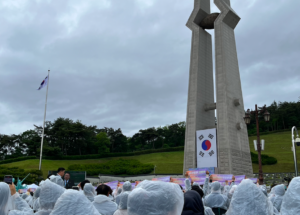Ethics of Memory: Remembering the May 18th People’s Uprising in South Korea
Seulbin Lee, 2023-24 RPW Center Themed Graduate Fellow. This year’s group is exploring the theme of “The Place of Memory.”
The Martyrs of Gwanju
During the 2023 national commemoration ceremony of the May 18th People’s Uprising in 1980, held in the city of Gwangju, a small group of activists who had traveled from Seoul raised their pickets, demanding the president legislate a special law to investigate the truth of the 2022 Seoul Halloween crowd crush. But because the ceremony on May 18th National Cemetery was dedicated to the martyrs of Gwangju, they carried out their protest in total silence. Their silence overwhelmed the presidential ceremony, as if the living had encountered the presence of the ghosts of the Halloween crush and the martyrs of the pro-democracy uprising of 1980.
The silent demand caused a stir. Cameras were quickly turned away from the pickets of the activists, zooming in on the president delivering his speech, while security guards were busy forcing the activists to put down their pickets. In this city, you cannot stop the activists from demanding truth.
The tension between the guards and the activists rose in silence, out of respect for the dead, who were murdered for their pro-democracy movement by the authoritarian South Korean regime during the May 18 People’s Uprising. The bereaved families of the 2022 crush from Seoul did not want to disrupt the ceremony. And the guards also had to move in silence to not disrupt the presidential remarks.
As I pulled out my camera to record what was happening, a citizen of Gwangju broke the silence and shouted to the guards “leave them alone.” The voice was solemn and firm. It was more of a scold rather than a polite request.
 Being conscious of the citizens, the guards grew hesitant to push the pickets down; the activists raised their pickets again. While the national broadcasting station refused to capture the scene on their livestream, those who had gathered that day were able to witness the silent standoff. As the security guards started to push down the pickets once again, the citizens of Gwangju now began to speak up “Leave It Alone.” The collective solemn demand was strong enough to stop the guards. But how? How could words alone carry the force necessary to halt the power of political enforcement?
Being conscious of the citizens, the guards grew hesitant to push the pickets down; the activists raised their pickets again. While the national broadcasting station refused to capture the scene on their livestream, those who had gathered that day were able to witness the silent standoff. As the security guards started to push down the pickets once again, the citizens of Gwangju now began to speak up “Leave It Alone.” The collective solemn demand was strong enough to stop the guards. But how? How could words alone carry the force necessary to halt the power of political enforcement?
There was a strong unspoken sentiment implied in the adamant demand—How dare you discourage activists demanding truth here? The pro-democracy activists of the May 18th Uprising had been criminalized by the South Korean government’s systematic enforcement of its own narrative for decades. As a result, the bereaved family members of the 1980 martyrs along with grassroots activists are still working on uncovering the truth for 41 years after the massacre.
Demanding Truth
These collective memories and the lost memories of the martyrs were present during the national ceremony, thereby reinforcing the ethos of respect for activism which has been cultivated in Gwangju for decades. In this city, you cannot stop the activists from demanding truth especially here on this sacred ground—where we celebrate the spirit of pro-democracy activists who stood up for freedom, dignity, and truth.
The presence of the absent combined with the spirit of the living created this liminal space in which ethical demands for truth-telling and democracy were given more authority than the president himself. This liminal space, however, is not fixated into the past. It was a dynamic one—open and flexible enough to form solidarity with the activists who had arrived from Seoul for the ceremony with their own political agenda. Yet this solidarity and inclusion, do not exist without tension. The silence overwhelming the dynamics embodies the tension. The ceremony should not be about the activists from Seoul; the Gwangju citizens cannot turn away from the activists either.
Being There
This dynamic that I participated in during the May 18 Commemoration Ceremony in Gwangju, South Korea in 2023—demonstrates how collective memory has the power to create a space with particular ethics and moral demands.
As a descendent of Gwangju, my research explores tensions and possibilities cultivated by collective memories of the May 18 Uprising. Following trajectories of the pro-democracy activists who have grown other democracy practices into the U.S. from South Korea, I explore how activists continued the spirit of May to create belonging and solidarities across border, race, and ethnicity in the midst of tensions and negotiation. My research engages in multi-cited ethnographic research through the transnational lens between South Korea and the United States with particular attention to spirit, spirituality, and religious practices.
Asian Americans have been stereotyped as a model minority. This is what Emilie Townes calls “fantastic hegemonic imagination” – a societal imagination that is not truth (fantastic) but is powerful enough so that people buy into it (hegemonic). The model minority myth is not only an impediment for communities of color to form solidarity but also a dehumanizing script that reduces a person into transactional values, which is psychological and spiritual violence. By excavating memories of the transnational activists, I hope to change the conversation about who we have been and who we can become together.
*I participated in the ceremony as part of the 2023 Gwangju Youth Democracy Forum organized by The May 18 Foundation. I want to acknowledge Park Jin-woo, Noh So-yoon, and Shin Ha-young for accompanying me in various democracy forums and research and Dr. Melissa Snarr and Dr. Jaco Hamman at Vanderbilt GDR, who supported me in this travel.
 Seulbin Lee is a Ph.D. student in Ethics and Society in the Graduate Department of Religion. She specializes in Christian Social Ethics and Political Theology, and her research interests include transnationalism, democracy, liberative historiography, and feminist decolonial praxis. Her current research explores the moral agency of transnational activists who carry the memory of the May 18th People’s Uprising in South Korea into the U.S. through the lens of religion. As a certified candidate in the United Methodist Church, her passion lies in connecting the traditions of UMC to her teaching of ethics as cultivating good troublemakers in the world. She is excited to be co-teaching a “Religion and Social Movement” course this fall, as a teaching associate, with Dr. Melissa Snarr.
Seulbin Lee is a Ph.D. student in Ethics and Society in the Graduate Department of Religion. She specializes in Christian Social Ethics and Political Theology, and her research interests include transnationalism, democracy, liberative historiography, and feminist decolonial praxis. Her current research explores the moral agency of transnational activists who carry the memory of the May 18th People’s Uprising in South Korea into the U.S. through the lens of religion. As a certified candidate in the United Methodist Church, her passion lies in connecting the traditions of UMC to her teaching of ethics as cultivating good troublemakers in the world. She is excited to be co-teaching a “Religion and Social Movement” course this fall, as a teaching associate, with Dr. Melissa Snarr.